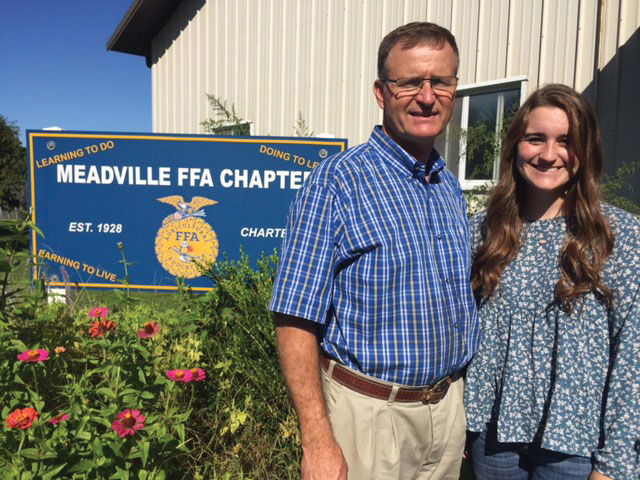The man on the tractor
October 5, 2019
Written By Neal Fandek
Like many Missourians, Phillip Martin, agricultural education instructor at Meadville R-I High School in north-central Missouri, grew up on a farm. Unlike most Missourians, he went on to teach in several mid- and northern Missouri high schools after graduating from the University of Missouri, first with a bachelor’s degree in science education then a master’s degree in agricultural education. He then returned to farming for nearly two decades before going back to teaching.

It’s not a standard teaching path, but Martin says it’s given him invaluable perspectives he passes on to the students he teaches and those he mentors as the school’s FFA advisor.
Martin says he’s just paying it back. He says William Mallory, who taught agricultural education from the 1950s-1989, and a man Martin calls one of the icons of agricultural education, mentored and inspired him. Martin’s first year of teaching at Bowling Green High School was Mallory’s final year of teaching, and Martin says Mallory encouraged him to take a risk and farm.
Not teach.
“He said that if I wanted to teach bad enough, I would have the opportunity later,” Martin says. “And that I’d be a much better teacher if I returned to the profession when production agriculture started to make my joints hurt and when winter mornings started feeling really cold!”
Frigid cold or searing heat, Martin and his wife, Heather, operate a diversified cow/calf operation with a small herd of hogs, sheep and Boer goats in eastern Linn County, about 30 miles from the school. He’s inspired all three of his children to enter agriculture professionally too.
Among the students he’s inspired are Kylee Baker, Meadville FFA vice president, who says Martin has inspired her to pursue a career in agriculture education. She calls him an “unbiological dad.”
“Mr. Martin not only teaches agriculture classes and gets us from Point A to Point B for FFA, but he is a farmer too,” she writes. “He wakes up early to do chores before school and goes home late to help his wife with chores at night. We learn about the hardships and successes of farming straight from the man on the tractor.
“What makes his class different is, students respect him. They listen. He uses analogies, he puts pictures in your head to make you understand. And he cares. He is the one to make sure you are doing all right in school. He is the one to take fresh tomatoes to a lady from the community that has just been moved to the nursing home.”
Martin says students like Baker make the sometimes 15- and 16-hour days of activities worthwhile: “The impact I have on these kids’ lives, the chance to be a part of that — it’s more valuable than I ever imagined. I am around these kids six years, and I see their growth, their maturing, their victories.”
Adds Meadville principal Misty Burnett of Martin, “He always gives 150 percent, provides lots of opportunities for our students, pushes them to do their best. He will make things happen for them. They just don’t make them like that anymore.”
Martin says his decades in farming and teaching have given him unique perspectives, such as how the three traditional Rs of education — reading, writing and ‘rithmetic — no longer apply.
Today’s three Rs, he says, are rigor, relative and relationships. Rigor demands students know more at the end of day than the beginning; that agricultural education must be relative and benefit students’ lives now and 30 years from now; and that forging relationships with students, parents and the community is essential for everyone to excel.
“I say to my students. I don’t want you to fly like hawks, I want you to fly like eagles,” Martin says in reference to his school’s mascot. “When you fly higher than hawks, you see more. And if I can get one student to get up there, I can get a second, because people like to travel together.
“I think I’ve inspired lots of kids who have flown like eagles.”

